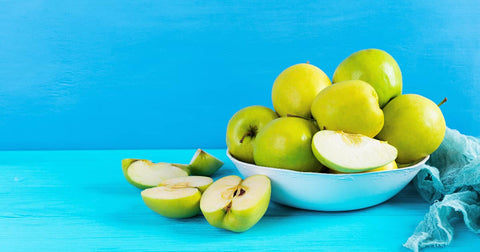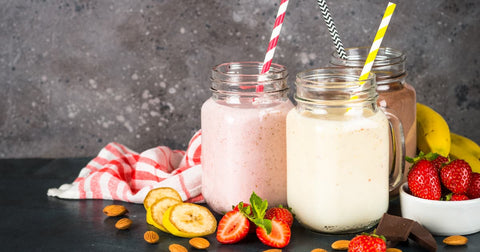Apricots, with their golden hue and delicate sweetness, are a delightful fruit enjoyed for their flavor and versatility in various dishes. But beyond their culinary appeal, apricots offer a wealth of potential health benefits, making them a nutritional powerhouse.

This article delves into the question, "Are apricots good for you?" We'll explore their nutritional profile and potential benefits and address common concerns about apricot seeds. We'll also discuss the importance of identifying food intolerances and how our food sensitivity test kit can help you make informed choices about your diet.
Are Apricots Good for You? A Nutritional Powerhouse
Yes, apricots are a healthy and nutritious addition to any diet. They're low in calories, fat-free, and packed with essential nutrients, including:
-
Fiber: Promotes digestive health and helps regulate blood sugar levels.
-
Vitamin A: Essential for vision, immune function, and cell growth.
-
Vitamin C: A potent antioxidant that supports immune health and skin health.
-
Potassium: An electrolyte that helps regulate blood pressure and fluid balance.
-
Antioxidants: Protect your cells from damage caused by free radicals.
Apricot Benefits: A Closer Look
1. Digestive Health:

Apricots are a good source of both soluble and insoluble fiber, which can help regulate bowel movements and prevent constipation.
2. Eye Health:
The vitamin A and antioxidants in apricots contribute to healthy vision and may protect against age-related macular degeneration.
3. Skin Health:
Vitamin C and other antioxidants in apricots support collagen production and protect skin cells from damage, promoting healthy, glowing skin.
4. Immune System Support:
Vitamin C and other antioxidants in apricots can help strengthen your immune system and protect against infections.
5. Heart Health:
The fiber and potassium in apricots can contribute to heart health by lowering cholesterol levels and regulating blood pressure.
6. Bone Health:

Apricots contain several minerals, including calcium and phosphorus, that are essential for maintaining strong bones.
Benefits of Apricots: A Versatile and Delicious Fruit
Apricots can be enjoyed in various ways:
-
Fresh: Enjoy them as a refreshing and nutritious snack.
-
Dried: Dried apricots are a convenient and portable snack option, but be mindful of their higher sugar content.
-
Jams and Preserves: Apricots can be made into delicious jams and preserves.
-
Baked Goods: Add chopped apricots to muffins, cakes, or other baked goods.
Dried Apricots Nutrition: A Concentrated Source of Nutrients
Dried apricots are a good source of fiber, vitamins, and minerals. However, they are also higher in sugar and calories compared to fresh apricots, so it's best to consume them in moderation.
Are Dried Apricots Good for You?
Yes, dried apricots can be a healthy snack option when consumed in moderation. They provide a concentrated source of nutrients and fiber, which can support digestive health and overall well-being.
Apricot Seeds: A Controversial Topic
Apricot seeds contain amygdalin, a naturally occurring compound that can be converted into cyanide in the body. Cyanide is a toxic substance that can be harmful in large amounts.
Apricot Seeds Benefits:

While some proponents claim that apricot seeds have anti-cancer properties, scientific evidence to support this is limited and controversial.
Apricot Seeds for Cancer: Proceed with Caution
It's crucial to consult your doctor before consuming apricot seeds or using them for medicinal purposes. Excessive consumption can lead to cyanide poisoning, which can be dangerous.
Food Intolerance and Digestive Health
If you experience digestive issues after consuming apricots or other foods, consider the possibility of food intolerances or sensitivities. These can trigger inflammation and disrupt your gut health.
Food Sensitivity Test Kit: Identify Your Triggers
A food sensitivity test kit can help you identify specific foods that might be triggering your symptoms. By eliminating or reducing these trigger foods, you can potentially alleviate your digestive problems and improve your overall gut health.
Key Takeaways:

-
Apricots are a nutritious and delicious fruit with various health benefits.
-
They can support digestive health, eye health, skin health, and immune function.
-
Dried apricots are a good source of nutrients but should be consumed in moderation due to their higher sugar content.
-
Apricot seeds contain amygdalin, which can be converted into cyanide, so it's crucial to consume them cautiously and consult your doctor before using them for medicinal purposes.
-
If you experience digestive issues after consuming apricots, consider a food sensitivity test to identify potential food intolerances.
Remember, this article is intended for informational purposes only and should not be considered a substitute for professional medical advice. If you have any concerns about your health or dietary choices, consult a qualified healthcare professional.
Frequently Asked Questions:
1. Can I eat apricot skin?
Yes, apricot skin is edible and a good source of fiber and nutrients. However, be sure to wash it thoroughly before consumption.
2. How many apricots should I eat per day?
A typical serving of apricots is about 3 medium-sized apricots. However, it's important to listen to your body and adjust your intake based on your individual needs and tolerance.
3. Are there any specific health benefits of apricots for women?
Apricots are a good source of iron, which can be beneficial for women who experience heavy menstrual bleeding or are at risk of iron-deficiency anemia. They also contain vitamin C and other antioxidants, which support skin health and immune function.
4. Can I eat dried apricots if I have diabetes?
Dried apricots can be included in a diabetic diet, but it's essential to consume them in moderation due to their higher sugar content. Monitor your blood sugar levels closely and talk to your doctor or a registered dietitian about incorporating dried apricots into your meal plan.
5. I'm experiencing digestive issues after eating apricots. Could it be a food intolerance?
Yes, it's possible to have a food intolerance or sensitivity to apricots. If you experience symptoms like bloating, gas, or diarrhea after consuming them, consider a food sensitivity test to identify potential triggers and make informed dietary choices.


.png?v=1737390083)
.png?v=1737187409)


